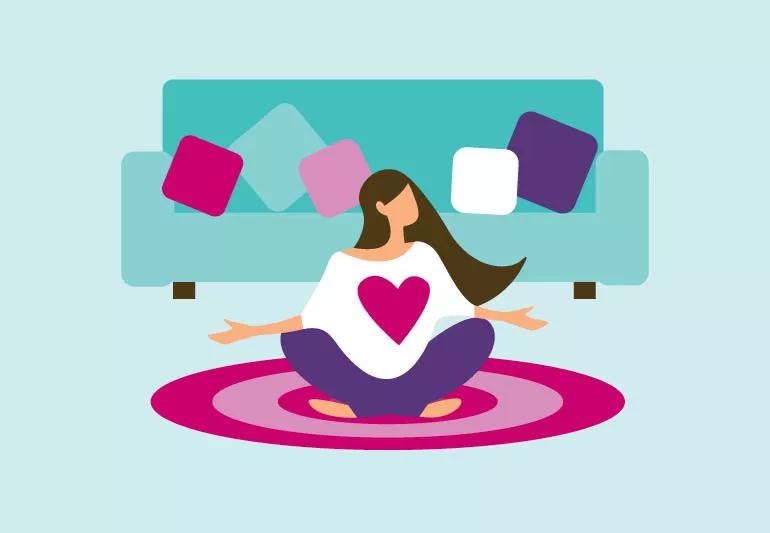Why it matters and how to actually do it

Image content: This image is available to view online.
View image online (https://assets.clevelandclinic.org/transform/d1e66b48-c3be-49dd-a3aa-9fdf61c59664/21-HHB-2137722-YouFirst-Article-Images_self-care-celebrate-you_jpg)
woman practicing yoga and taking care of herself
Self-care is what preventive medicine physician Roxanne B. Sukol, MD calls “revolving on your own axis.”
Advertisement
Cleveland Clinic is a non-profit academic medical center. Advertising on our site helps support our mission. We do not endorse non-Cleveland Clinic products or services. Policy
It means putting yourself first – even if only for a few minutes – so that you can show up as your best self to step up and share your resources with others.
“In an effort to care for those we love, many of us spread ourselves too thin and forget that nothing good can happen if we don’t keep ourselves on the priority list. We need to love and be kind to ourselves, manage stress, sleep better, nourish our bodies and boost our self-esteem,” says Dr. Sukol.
Here are 10 small ways to help you do just that.
Who can’t commit to just one minute? Try this while you’re in a meeting or standing in line at the grocery store. Breathe in for five seconds and then breathe out for five seconds. Repeat this five times.
Setting an intention each morning can help you set the tone for the rest of your day. It’s a powerful visualization technique that can help streamline your thoughts. Try something like, “Today will be a good day” or “I will do my best today” or even “I will drink enough water today.”
Walking is good for both your body and your mind. And the great news is – even short walks count! Walking can reduce stress and anxiety, make you feel happier and can actually increase your self-esteem. Studies show that your body releases endorphins (aka feel-good hormones) after just a few minutes of walking.
Advertisement
Revisit a hobby you don’t do anymore because you don’t have time. Can’t seem to find time to read? Download an audiobook and listen to it in the car. Used to love crafting, but can’t seem to make time for it? Take out the craft box when you’d normally settle in to watch TV for the evening.
Saying “no” does not always come easily. Like many things, it can take time to develop this skill. But there’s no need to explain why you can or can’t do something. In fact, the more you say no, the easier it will become. Rehearse how you’ll say it, be direct and offer alternatives.
Go ahead and dim the lights, turn off your phone and close your eyes. This is even more important if you’re bouncing from one Zoom meeting to the next. It’s crucial for your brain to power down and have a few minutes to reset between activities.
Give your food the attention it deserves and sit down (away from the TV) to enjoy your snack or meal. Also try to finish your dinner or last meal of the day at least three hours before bedtime.
Sleep isn’t a luxury – it’s a necessity. Sleep loss is a big deal, probably even bigger than you think. Sleep deprivation causes fatigue, low energy, irritability, forgetfulness and it can increase your risk of heart disease. Start by going to bed 15 minutes earlier.
If we’ve learned anything from a global pandemic, it’s that life is short and relationships and experiences matter. Be open to trying new things, meeting new people and learning new skills. Try doing chair yoga, taking a pottery class, going on a date or learning more about spreadsheets or even aroma therapy if that’s what interests you.
Studies show that what you eat can affect your mood. To feel and perform your best, go for colorful beans, fruits and veggies, nuts, seeds and whole grains. The Mediterranean diet has also been shown to decrease symptoms of depression.
Advertisement

Sign up for our Health Essentials emails for expert guidance on nutrition, fitness, sleep, skin care and more.
Learn more about our editorial process.
Advertisement
Like being your own best friend in times of trouble, self-love is an act of self-preservation
This state of mind is all about focusing on what you love and enjoy (minus the FOMO)
Silence your inner critic by treating yourself with kindness, understanding and empathy
You may need a mental shift to start caring for your physical and mental well-being
Take time to prioritize yourself, even (especially) when you’re consumed with prioritizing others
Silence that mean voice in your head by treating yourself with gentle care and respect
An expert weighs in on the best ways to start taking care of yourself
And regain your sense of self while doing it
Type 2 diabetes isn’t inevitable with these dietary changes
Applying a hot or cold compress can help with pain
Pump up your iron intake with foods like tuna, tofu and turkey